I installed a new 2.5-gallon point-of-use water heater under my kitchen sink exactly one year ago. My old one failed after less than three years, and it wasn’t covered under warranty because I was supposed to inspect the sacrificial anode rod every year, and replace it at least every two years. My bad. I didn’t read the fine print on the warranty. But now I know (and knowing is half the battle).
So I created an event on my calendar to inspect the anode rod exactly one year later. To do this, I had to uninstall my water heater, unplug it, empty the tank, and take some stuff apart. See below.
Take a close look at that anode rod. At this point, you’re probably saying “What anode rod?”
Yeah, exactly. It’s entirely gone; it looks like half of an incense stick. All that’s left is the wire core. For comparison, here’s a new anode rod and what was left of my old one.
The old anode rod disintegrated at the threads when I tried to unscrew it, and the new one screwed into place just fine.
I put everything back together and ran hot water into the tank, but my kitchen faucet promptly clogged with sediment that had washed out of the tank. I took my faucet apart and cleaned out the aerator, and everything worked fine again after that.
Summary
The water in my city is very hard on water heaters. I should probably make a point of replacing the anode rod every six months. And now I feel the urgent need to inspect the anode rod in my traditional tank water heater. I’ll report back with my findings soon.

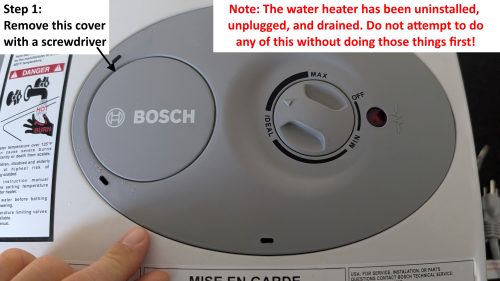
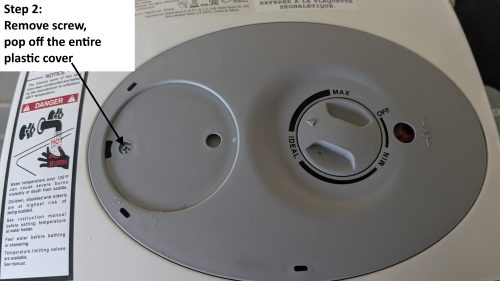
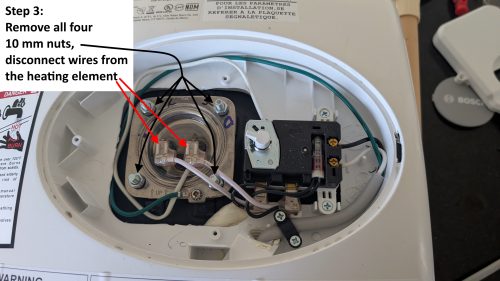
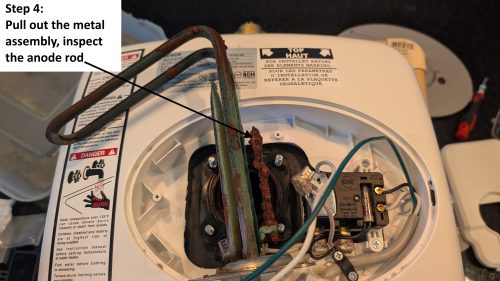
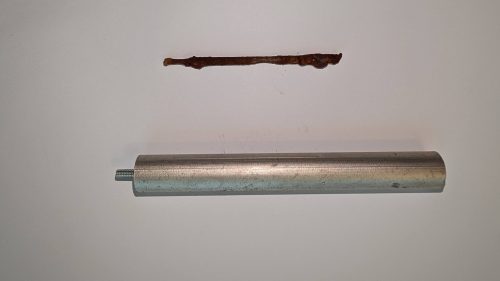
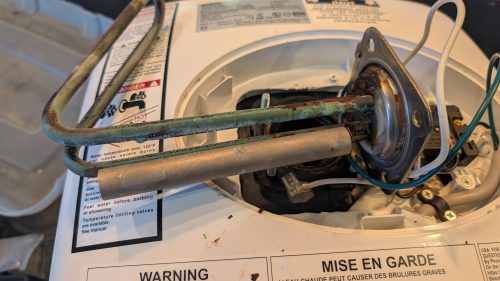
Gerd K
October 8, 2024, 10:51 am
Some of that water may be consumed.I wonder if there are health implications with that much of metal etc being in it?
Reuben Saltzman
October 8, 2024, 10:56 am
Hi Gerd,
That’s a great question. The product description for the anode rod says “High Quality and Safe Material: Pure High-Quality Magnesium anode rod made from top-quality magnesium AZ31-alloy, non-toxic, and entirely safe for the human body”.
But is it really? I don’t know. I have my doubts. I installed a reverse osmosis system at my kitchen sink earlier this year, and this is now the only water I drink or cook with.
Miss Hell
October 9, 2024, 2:51 pm
You might consider plumbing a strainer upstream of that water heater; the water in our region is also pretty hard, (Texas) and full of sand. Sediment in the water may also have contributed to the short lifespan of that annode rod. As an experiment, I installed a GHT spigot/faucet screen/strainer on the washing machine; we have a stacked washer/dryer, so repairing issues with the washing machine also require diddling with the dryer. The inlet screens on the fill valves are constantly plugging up due to the hard water, and getting at them is a pain.
Also had the pleasure of replacing the fill valves when one of the failed, likely due to sediment and high (95 psi) water pressure.
Installed a GHT strainer and separate pressure reducer on the spigot about a year ago, and was astounded at how much sediment is captured by the strainer. Easier to access and clean than the washing machine inlet screens, and I can see when cleaning is needed with just a flashlight. Now planning to plumb a ‘whole house’ strainer upstream of the tankless water heater that serves the utility room (as well as the kitchen and one bathroom) and removing the one on the washing machine spigot. (I only use the HOT side, the cold spigot is capped… 100% of the water going into the machine is hot AND screened… no more ‘cold water rinses’ and the laundy is CLEAN now.)
No issues with smelly washing machine tub, no skin issues with detergent lingering on clothing. Any ‘cold water’ laundry.. I just turn off the tankless water heater for one load. I also believe this helps keep the laundry drain clear and clean, since only hot water flows through it.
Adding a strainer to your water heater may save much aggravation later, and extend the life of your appliances too.
Reuben Saltzman
October 10, 2024, 12:32 pm
Thank you for the tips, much appreciated.
Tim
October 17, 2024, 3:28 pm
That’s something to bring to the attention of your community’s water district/provider. Their water chemistry may need some attention.